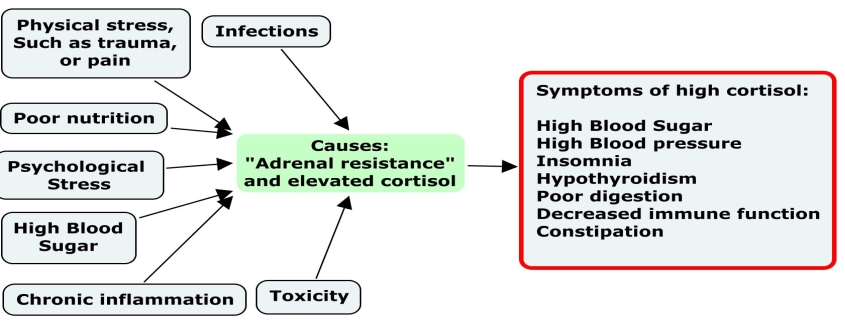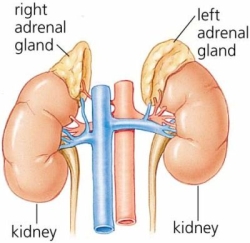
Let us more closely consider the relationship of severe eczema, topical steroids and the adrenal glands.
What are the Adrenal Glands?
 Located on top of the kidneys, the adrenal glands are largely responsible for producing the hormones we need, especially in times of stress. They also regulate the amount of energy your body has and how energetic you feel. You have two adrenal glands, one for each kidney, and they are comprised of two major parts; the ‘adrenal medulla’ and the adrenal ‘cortex’.
Located on top of the kidneys, the adrenal glands are largely responsible for producing the hormones we need, especially in times of stress. They also regulate the amount of energy your body has and how energetic you feel. You have two adrenal glands, one for each kidney, and they are comprised of two major parts; the ‘adrenal medulla’ and the adrenal ‘cortex’.
The adrenal medulla is primarily responsible for aiding the stress response in the body. You probably know it as the “fight or flight” response. When stress occurs, the adrenal glands release epinephrine and norepinephrine. These two hormones raise the blood sugar level in the body, allowing you to have more energy (you’ll notice an increase in heart rate). They increase and extend the effect of the stress response, which explains why stress might still be felt after a traumatic event.
The adrenal cortex is the outer part of the adrenal glands and it produces glucocorticoids, instructing the liver to produce more sugar from fats and proteins, as well as acting as an anti-inflammatory agent. Glucocorticoids in the adrenal cortex produce hydrocortisone and corticosterone. The adrenal cortex is also responsible for releasing sex hormones and mineralcorticoids (hormones that help regulate blood pressure by reducing water loss in the kidneys). The adrenal cortex produces cortisol, a stress hormone that reduces immune response by suppressing inflammation and other parts of the immune system.
Eczema, Stress and the Immune System
While the exact cause of eczema is still not fully understood, it is largely considered to be the result of an overactive immune system. Eczema can be caused by external irritants or an abnormal response to proteins that are part of the body. Eczema causes anxiety for individuals of all ages and anxiety is one of the primary triggers for stress. To control stress, the body creates a hormone known as cortisol, which suppresses the immune system and this leads to greater inflammation – especially on the skin.
What is HPA Axis Suppression?
The HPA Axis is more commonly known as the body’s “stress system” and “energy regulator.” A high level of stress in the body leads to high levels of cortisol. HPA Axis (hypothalamic–pituitary–adrenal) Suppression is the result of constantly high hormone/cortisol levels that result in a suppressed immune and inflammatory response. The body releases large amounts of cortisol and adrenaline in response to “fight or flight” mode and eventually, it has trouble producing any more. Supplied are limited.
When a stressor is eliminated, your body normally stops producing additional hormones. In the case of eczema, these hormones are often continually produced in response to the stressors that don’t get eliminated. Unfortunately, the adrenal glands can only produce a finite amount of stress hormones, without being “recharged” (eliminating the stressor). After these reserves are depleted, the signals keep coming that more hormones are needed. While it is vital to health for the adrenals to secrete more cortisol in response to stress, it is also very important that bodily functions and cortisol levels return to normal following a stressful event. Adrenal fatigue, or hypothalamic pituitary adrenal axis dysfunction, can result from low levels of cortisol and health conditions of the body can quickly deteriorate. When adrenal glands don’t produce enough hormones, this can lead to adrenal insufficiency (Addison’s disease). Common symptoms of low cortisol include dark rings under the eyes, unexplained weight loss, fatigue, dizziness, heart palpitations and cravings for salty food.
High levels of stress can lead to Chronic Fatigue Syndrome (CFS) and untreated, this can lead to HPA Axis Suppression.
Do Topical Steroids Cause HPA Axis Suppression?
Topical steroids work by altering chemicals that cause inflammation. The most potent forms are Class I and they are 600-1000X stronger than over the counter hydrocortisone 1%, which is a Class VII. Side-effects of mild steroids are extremely rare and uncommon. As these creams are applied directly to the skin, there is a possibliity that limited absorption into the bloodstream can occur. These man-made drugs closely resemble the cortisol hormone in the body and therefore, there is the possibility this can lead to a decrease in natural cortisol levels. Replacing natural hormones with synthetic ones are the principles of hormone replacement therapy. An unusually high amount of synthetic cortisol over an extended period of time will send signals to the body that less natural cortisol is needed, however, HPA Axis Suppression is far more likely with oral/inhaled steroids than topical steroids, as oral steroid therapy actually takes over adrenal function.
Choosing Topical Steroids or TSW in Considering HPA Axis Suppression
Rather suffering with ongoing, severe eczema through the process of TSW or utilizing topical steroid treatments, it’s important to recognize that untreated eczema (or treating holistically) carries a far greater risk of developing HPA Axis Suppression. Indeed, individuals going through TSW report a much higher incidence of HPA Axis Suppression than individuals using topical steroid treatments to treat eczema.
How to Avoid HPA Axis Suppression in Treating Eczema
Patients applying a potent topical steroid to a large surface area or to areas under occlusion should be evaluated periodically for evidence of HPA axis suppression. This may be done by using the ACTH stimulation, A.M. plasma cortisol, and urinary free cortisol tests. Whatever your plan for treating eczema, work with your doctor and demand that these tests be performed to ensure that the chosen treatment is the best choice.
A well-known safer option for using topical steroids to treat eczema has been devised by Dr. Richard Aron. Dr. Aron combines an antibiotic with moisturizer in treating eczema. This mixture is believed to allow for less topical steroid absorption while the antibiotic more effectively deals with the skin inflammation. With over 40 years of treating thousands of chronic eczema cases, Dr. Aron’s method has not seen any individuals suffer from HPA Axis Suppression.
* This page is intended for informational purposes only. Please see your doctor if you have specific questions regarding your health.
